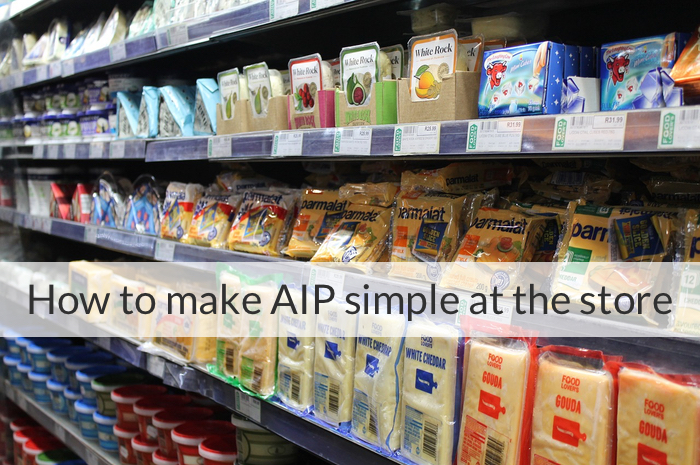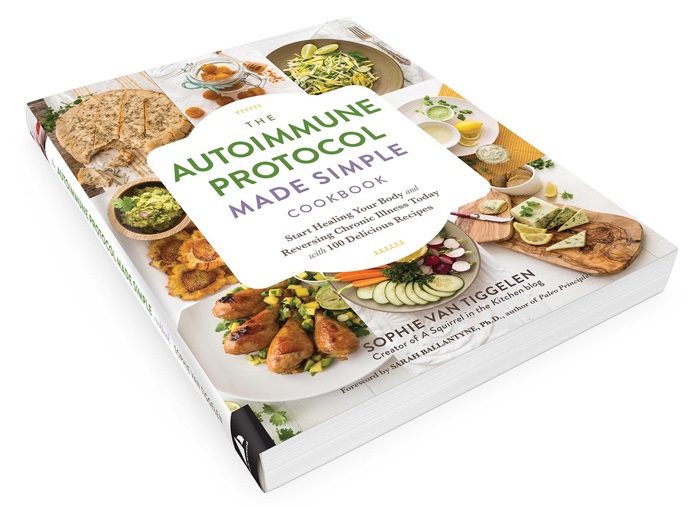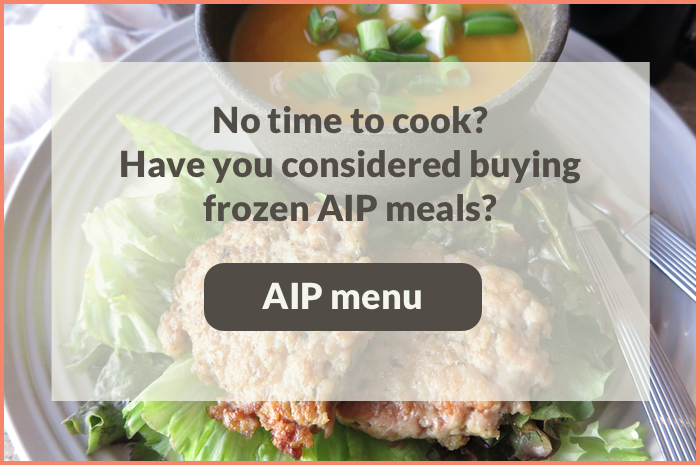How to Make AIP Simple at the Store
 “How to Make AIP Simple” is a series on my blog focused on providing practical tools and actionable information to help you easily implement the Autoimmune Protocol into your life. My goal is to get you started on AIP as quickly as possible, so you get results as fast as possible. This series was inspired by my new cookbook The Autoimmune Protocol Made Simple, which places its emphasis on variety, simplicity, and nutrient-density. I hope you enjoy both the book and my tips for keeping it simple!
“How to Make AIP Simple” is a series on my blog focused on providing practical tools and actionable information to help you easily implement the Autoimmune Protocol into your life. My goal is to get you started on AIP as quickly as possible, so you get results as fast as possible. This series was inspired by my new cookbook The Autoimmune Protocol Made Simple, which places its emphasis on variety, simplicity, and nutrient-density. I hope you enjoy both the book and my tips for keeping it simple!

How to make AIP simple at the store
Now that you have embarked on the Autoimmune Protocol, the way you shop for food is going to change, reflecting your new eating habits and the foods you can (and can not) eat. Beyond the obvious, staying away from all gluten-laden and sugary foods, I have a few tips for you to make your grocery trip a little bit easier.
1 – Start with meal planning and shop with a list
Bear with me on this one, because it is a little bit of work up front, but it will save you a lot of time down the road. It pays off to figure out which meals you would like to prepare for the week, and write up a list of all the ingredients you will need to cook these meals. Being prepared with a list means less last minute trips to the grocery store, and less impulse buys!
Not familiar with the concept of meal planning? Want some help to get started? Check out these meal plans! They offer personalized meal planning options based on your specific diet, such as paleo or AIP.
2 – Stay on the outside perimeter of the store
If you are on the autoimmune protocol, the vast majority of the items you will need are located on the outside perimeter of the store. That’s where you will find fresh ingredients. The aisles located at the center of the store are loaded with dry and processed foods. I don’t know about you, but the less I see those cookies, the better I am! That is not to say that you won’t be able to find a few AIP-compliant, pre-packaged convenience foods such as seaweed snacks, sardines, tuna, coconut milk, or meat-based protein bars.
3 – Take advantage of pre-packaged vegetables and fruit
We are seeing more and more mainstream grocery stores offering healthy options for their customers, which is great! Often, you will find an assortment of pre-washed and pre-cut vegetables such as spiralized vegetable noodles (zucchini, sweet potatoes, beets), diced butternut squash, sliced red cabbage, etc. These items are a real time saver since you don’t have to wash and cut your veggies; they are ready to go! They also can be used as healthy crunchy snacks.
4 – Should you buy organic?
If your budget permits it, yes, choose grass-fed meat, wild-caught seafood, and organic produce. Does it mean that you can’t reap the benefits of the autoimmune protocol if you eat conventional foods? Absolutely not! Eating organic is better, but it isn’t a necessity to improve your health. Follow these basic recommendations when purchasing conventional food:
- focus on variety and nutrient-density: choose seasonally and locally grown produces when available, and make sure you eat a wide variety of veggies (to increase the range of nutrient intake).
- know the AIP-specific “dirty dozen and clean fifteen”
- stick with lean cuts of meat and limit poultry
- avoid refined vegetable oils
- wild-caught fish can be pricey, so choose canned tuna, salmon, and sardines instead
5 – Get your AIP pantry products in one location
I find it easier to get all my AIP pantry items in one convenient place. Shop AIP is an online store selling exclusively AIP-compliant products so you don’t have to be super vigilant with the labels. As a bonus, they offer free shipping! Check out this post to find out which AIP products I keep in my pantry at all times.
6 – Buy local and seasonal
Buying local and seasonal means that you will eat a much wider variety of foods, following the rhythms of the seasons, which will naturally bring you a wider range of nutrients. Since local and seasonal produces are more abundant, they are also more affordable! Some grocery stores, especially health food stores and local chains, deal directly with local farmers. Local farmers markets are also a great way to find in season veggies and fruit.
7 – Read the labels!
This is not a problem if you are buying fresh ingredients, such as meat and vegetables, but the danger is real when buying pre-packaged food. I am talking about all these sneaky, unhealthy ingredients ending up in seemingly innocuous products. For example, the non-AIP-compliant spices in pickles or bacon, hidden gluten in deli meats, or guar gum in some canned coconut milk.
Always, always read the label when you pick up a product to make sure that all the ingredients are AIP compliant. In case of doubt, put it back on the shelf, it’s not worth it!
8 – Cut and prep your ingredients when you get back home
I like to prep my veggies when I get back home from a grocery trip. I wash, cut, chop, slice and store my vegetables in resealable plastic bags in the refrigerator. I love the convenience of having fresh veggies ready at all times; whether I need them to cook a meal or if I need a little healthy, crunchy snack on the go.
I know, some of you will argue that pre-cut vegetables might lose their nutrients more quickly. True, but the convenience of having fresh produce ready to eat might help you make healthier choices and increase your overall vegetable intake in the long run. Follow these tips to get the most from your produce:
- keep pre-cut veggies in airtight containers in the refrigerator
- consume pre-cut veggies first, within five to six days
- when edible, leave the skin on when chopping (sweet potatoes, carrots, beets, cucumbers, etc.)
- avoid prepping white sweet potatoes as they tend to turn brown quickly

Source: https://asquirrelinthekitchen.com/aip-simple-store/
